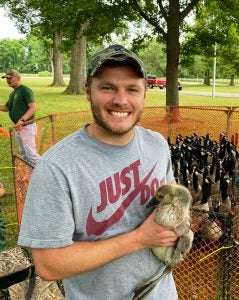
John Veon is a PhD student in the Graduate Group in Ecology at the University of California, Davis and is co-advised by Dr. John Eadie and Dr. Daniel Karp. In 2018, John received his BA in Biology from Hendrix College in Conway, Arkansas. Here, John conducted his first independent study on the effects of anthropogenic noise on waterfowl behavior. In 2021, John received his MSc in Biology from the University of Arkansas in Fayetteville, Arkansas. During this time, John was also a member of the USGS Arkansas Cooperative Fish and Wildlife Research Unit. John’s thesis studied long-term trends in mallard (Anas platyrhynchos) body mass dynamics in the Lower Mississippi Alluvial Valley. Aside from training in wildlife research from his academic career, John also is a lifelong waterfowl hunter and fisherman and has first-hand experience managing a wide array of wildlife habitat while working for state agencies like the Arkansas Game and Fish Commission.
John is broadly interested in using fundamental ecological theory to unravel how wildlife respond to management techniques within working landscapes. Specifically, John is interested in researching sustainable ways to conserve and protect wetland ecosystems and the wildlife species that use them. At UC Davis, John is experimentally investigating differences in hydrological management techniques in large wetland units in the Central Valley to better understand how management may better regulate mosquitos – pests that facilitate disease transmission to humans and livestock here in California. Specifically, John plans to investigate how hydrological techniques may influence the predator-prey dynamics between macroinvertebrates and mosquitos, the trophic flow of energy in wetlands (through food resources such as macroinvertebrates and moist-soil seeds), as well as other wetland ecosystem goods and services. Ultimately, John hopes to use applied ecology, combined with his background as an outdoorsman, manager, and academic researcher, to develop feasible management techniques for land managers to conserve wetland ecosystems in the face of a rapidly urbanizing landscape.